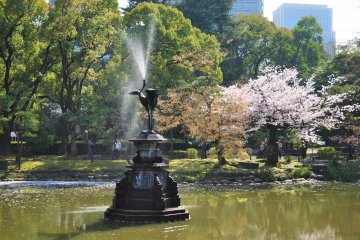
도쿄 파머스 & 키드 페스타 2018 2026
Sleiman Azizi도쿄 히비야 공원에서 어린이들을 위한 이틀 간의 농사 음식 축제가 열린다. 11월 10일과 11일에 열리는 이 축제는 아이들에게 음식이 어디서 왔는지 가르쳐주고 많은 체험 활동을 선보이는 것을 목표로 하고 있다.

As one of the largest green spaces in Tokyo, Yoyogi Park is a magnet for Tokyo residents who want to enjoy the sun and nature or who would like to attend one of the many festivals that take place in the park all year round.
Although Yoyogi Park has relatively few cherry trees compared to other parks in Tokyo, it is a beautiful vantage point for the cherry blossom in spring. He is also known for his ginko trees, which turn gold in autumn.
Before the park became a city park in 1967, the area was the site of the Olympic Village for the 1964 Olympic Games. Yoyogi Park is right next to the Meiji Shrine.
Tokyo Metro Chiyoda line: Yoyogi Koen (Exit 3 or 4) or Meiji-jingumae/Harajuku Station (Exit 2) JR Yamanote line: Meiji-jingumae/Harajuku station (Omotesando Exit)

도쿄 히비야 공원에서 어린이들을 위한 이틀 간의 농사 음식 축제가 열린다. 11월 10일과 11일에 열리는 이 축제는 아이들에게 음식이 어디서 왔는지 가르쳐주고 많은 체험 활동을 선보이는 것을 목표로 하고 있다.
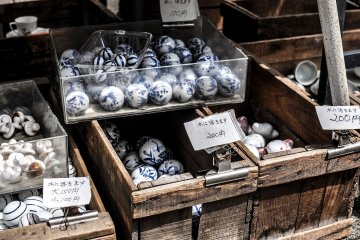
도쿄의 가장 크고 가장 비정규적으로 열리는 벼룩시장 중 하나인 하라쥬쿠 역 근처 요요기 공원 벼룩시장은 보통 오전 9시나 10시에서 오후 4시 사이에 주말에 열린다. 만약 좋은 시기에 오시게 된다면, 방문 중 옷부터 도자기, 다른 공예품, 골동품 그리고 맛있는 간식까지 모든 종류의 물건을 파는 수백 명의 상인들을 찾아 볼 수 있을거다. 야마노테 선 하라쥬쿠 역에서 도보 3분 거리에 요요기 공원이 위치해 있으니 아주 쉽게 접근 가능하다.

요요기 공원의 매력적인 분위기를 즐기세요. 공원에는 트럼펫 연주자, 바이올리니스트, 기타리스트, 첼로 연주자, 드제리두 연주자 등 음악이 가득하기 때문에 어디에서나 음악을 느낄 수 있다

도쿄 요요기 공원에서 열리는 타이 (태국) 페스티벌 매년 봄 가장 기대되는 국제 축제 중 하나이다. 일본에서 흔하지만 핫한 관광지로 알려진 태국이지만, 굳이 태국에 가지 않으셔도 이번 기회는 요요기 공원에서 태국 문화를 접할 수 있게 된다. 올해 열릴 예정인 축제에서는 무려 100개의 노점들이 태국 전통 음식, 과일 스무디 등을 판매할 것이라고 한다. 이뿐만 아니라 불상 등을 포함한 태국 전통 수공예품, 그리고 태국 전통 음악 퍼포먼스도 선보일 예정이니 많은 참석 부탁드린다! 입장은 무료료 가능하고 오전 10시부터 오후 8시까지 열릴 예정이다. 참고로 코로나바이러스 사태 때문에 일정이 바뀔 가능성이 크니 우측 상단 웹사이트를 수시로 확인하자.

매년 도쿄 요요기 공원에서 열리는 라오스 페스티벌은 도쿄의 해외 개최 이벤트 중 첫 페스티벌을 선보여왔다. 작년에는 무려 18만 명이 방문한 축제에서 올해도 라오스 전통 무용과 음익, 현지 음식을 먹을 수 있으니 꼭 와보시면 좋다. 라오스를 가보신 적이 있으신 분들은 눈이 익숙한 라오스 음식을 이곳 도쿄에서 다시 찾아볼 수 있을거다. 이뿐만 아니라 전통예술부터 다양한 라이브 공연이 펼쳐지고 다채로운 에고백 만들기 워크샵 등 여러 종류의 세션이 열릴 예정이다. 참고로 코로나바이러스 사태 때문에 일정이 바뀔 가능성이 크니 우측 상단 웹사이트를 수시로 확인하자.


도쿄 히비야 공원에서 어린이들을 위한 이틀 간의 농사 음식 축제가 열린다. 11월 10일과 11일에 열리는 이 축제는 아이들에게 음식이 어디서 왔는지 가르쳐주고 많은 체험 활동을 선보이는 것을 목표로 하고 있다.
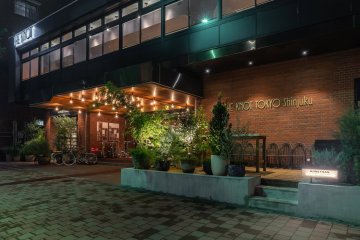
Located right next to Shinjuku Chuo Park, THE KNOT TOKYO Shinjuku is a modern hotel with an exceptional design and easy access to the nearby Shinjuku train station and the Meiji Shrine. The 14-story hotel building was renovated and reopened in August 2018 as THE KNOT TOKYO Shinjuku . The western-style rooms offer a park view on the top floor as well as a newly opened terrace suite. The spacious atrium design offers a relaxed atmosphere and connects the restaurant, bar, lounge and lobby with one another. One of the highlights of THE KNOT is the delicious dishes. There are six areas in which food and drinks are offered. From the grill area to high-quality black tea and fresh bread, everything is on offer.

With Koenji being a "creative town" it's no surprise that the BnA Hotel opened there in 2016 and has had, subsequently, an incredible impact on the local community. BnA (Bed and Art) has other spaces dotted about Tokyo and Kyoto, but the Koenji edition is possibly more immersive as the concept is "stay in an artwork." In collaboration with local artists, the BnA has created an impressive multi-storey art experiment for art lovers and creatives with a desire to inhabit art. The first floor acts as a front desk and bar which comes alive at night with events and selected DJs. It also hosts Masu Masu onigiri cafe with artists being asked to come and exchange artwork with each other in a gesture which reflects the true spirit of Koenji. With two "living art" twin rooms taking up the second and third floors designed by a seasonal rotation of local artists, guests can engage with and inhabit their art rooms. BnA Koenji also plays host to a rooftop lounge and a basement space which is used for artists residencies where their work is shown to the public and a DJ booth and streaming equipment for live performances. With live painting events and an eclectic variety of regular events, the BnA Hotel becomes, itself, a living canvas. The BnA believes that it's a machigata hotel, meaning that guests should (and are encouraged) to interact with Koenji. Use the public sentos, eat in the local restaurants that surround the hotel and buy locally from the multitude of shops, market stalls, bars and cafes which make-up the fabric of Koenji. Feted by international press such as The Guardian, BnA acts as a creative network with the concept of serendipity being discussed as the bar becomes an ad hoc meeting place where collaborations and friendships between artists and locals are born. The BnA was also instrumental in a street art festival named MCP (Mural City Project) which was supported by Suginami Ward. MCP was incredibly ambitious and truly communal with the desire to transform and coalesce the community through the creation of public murals. The BnA, Koenji and Suginami spearheaded a public art movement which should be commended and replicated throughout Tokyo.
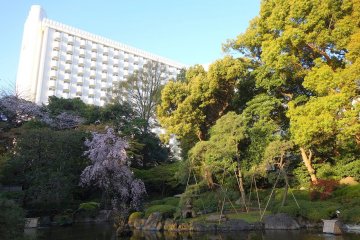
Just minutes from Shinagawa Station, the Grand Prince Hotel New Takanawa is surrounded by lush greenery in the Takanawa area, with rooms offering balcony views of the nearby gardens and the surrounding Tokyo cityscape. This urban resort features convention facilities like the Hiten banquet hall, the international Convention Center Pamir, as well as a wide variety of Japanese, Chinese and Western restaurants.

Mame Shiba Cafe offers a unique experience where you can interact with Shiba dogs while enjoying your favorite drinks. You cannot make reservations in advance through phone or online, so it is best to book early in the morning at a store. The cafe requires customers to make a reservation in-store, present their receipt at the reserved time, and then enter the cafe.

B-Flat Commune is an open-air hangout in Omotesandō featuring a variety of stalls and food trucks offering unique drinks, clothing, and bites to eat. Its relaxed vibe and plenty of seating make it an ideal spot for casual meetups and spending time with friends. It's a creative place where people can gather to eat a the open-air dining space or purchase fashion, antiques, product goods and other lifestyle items. Events are sometimes hosted at this community space, and operating stores may change from month to month.

If you're a fan of Quentin Tarantino’s Kill Bill, there's one Tokyo restaurant that absolutely deserves a spot on your bucket list. While you may not know it by its real name, chances are you've seen it on screen—it’s the unforgettable setting for the iconic, over-the-top showdown between The Bride and the Crazy 88. Known affectionately by fans as “The Kill Bill Restaurant,” this venue offers more than just cinematic nostalgia—it's a vibrant and unique dining experience in its own right. Located in Tokyo’s upscale Nishi-Azabu district, this classic-style izakaya bar is where fiction meets flavor. Though the fake blood and samurai swords have long been cleaned away, the spirit of the film lives on in the architecture and atmosphere. Stepping inside feels like walking onto the set: a grand, high-ceilinged hall with a central open-plan dining space, surrounded by a mezzanine-level balcony—instantly recognizable to anyone who’s watched the movie. But don’t mistake it for just a movie-themed attraction. The Kill Bill restaurant is a serious culinary destination. It offers a wide variety of traditional Japanese dishes, from sashimi and grilled skewers to noodle dishes and seasonal specialties. The menu also boasts creative fusion items like avocado and camembert tempura, which nods to the restaurant’s global popularity and mindset. And for international travelers with specific dietary needs, the restaurant provides vegan and halal-friendly menus (with at least three days’ notice). What makes this spot truly special is its ability to deliver a top-tier gourmet experience while doubling as a pop culture pilgrimage. You can sip sake where Uma Thurman once sliced through waves of enemies—minus the chaos, of course. Whether you’re a die-hard Tarantino fan, a foodie on the hunt for authentic Japanese flavors, or simply someone looking for a unique night out in Tokyo, this restaurant checks every box. Just one tip: Enjoy the drinks and dishes, but leave the swordplay to the professionals. Note: As you’d expect, Gonpachi is a popular restaurant. Same-day reservations are possible, but ideally you’ll want to reserve your table at least two days ahead of your visit, and even earlier if you’re planning to visit at the weekend.

Meiji Jingu is located in technologically advanced Tokyo and only a few minutes from the quirky streets of Harajuku. This famous Shinto shrine is hidden among a thickly forested area, creating an atmosphere of tranquility in the heart of Japan's bustling metropolis. Meiji Jingu is one of the most popular shrines in Tokyo and is visited by millions of people every year. The shrine’s daily ceremonies, incredible architecture, and scenic grounds make it a memorable and rejuvenating destination for tourists and Shinto practitioners alike. History The relatively recent shrine was built in 1920 to commemorate Japan’s first modern emperor and empress, Emperor Meiji and Empress Shoken. In 1867, Emperor Meiji ascended to the throne, effectively marking the end of Japan’s feudal era and the beginning of the Meiji Period. During his rule, Emperor Meiji guided Japan into a more modern and westernized way of life and revamped international relations by building connections with other countries. The shrine was tragically destroyed by 1945 bombings, but was quickly rebuilt in 1958 thanks to public donations. Today Meiji Jingu and its surrounding forest stand as a beacon of the Shinto faith, creating an atmosphere of harmony between first-time guests, practitioners, nature, and the past. Given its location in Tokyo, the easily accessible shrine is a common destination for visitors. Meiji Jingu is open every day from sunrise to sunset and has no admission fee. The shrine has one southern entrance and two northern, all of which are marked by towering torii gates. When visitors pass under the gates, which mark the separation between the sacred and secular world, it is customary to bow. The path to the shrine’s main complex is lined by a lush forest composed of over 100,000 trees and a variety of plant species, many of which were donated to the area from all over Japan. The densely wooded area effectively blocks out the sights and sounds of Tokyo, enveloping visitors in an environment of zen where they can clear their minds as they walk to the main shrine entrance. Once visitors step across the threshold onto the main grounds, they can leave their everyday worries behind and immerse themselves in the shrine’s architectural beauty and Shinto practices.
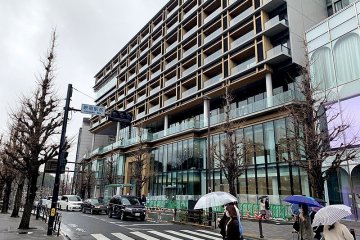
With easy access from Harajuku Station, ‘With Harajuku’ is the premier shopping and residency space for the glamourous fashion Mecca. At With Harajuku, residents can be an active part of the quickly changing trends of Tokyo. In addition to the living area, visitors to the area can take advantage of With Harajuku’s great shopping and dining offerings, including a new Ikea.

The Tōgō Shrine was established in 1940 and dedicated to Gensui The Marquis Tōgō Heihachirō shortly after his death. This shrine was destroyed by the Bombing of Tokyo, but was rebuilt in 1964. It is located in Harajuku, Tokyo, Japan. There, The Marquis Tōgō Heihachirō is celebrated as a shinto kami. [Wikipedia]